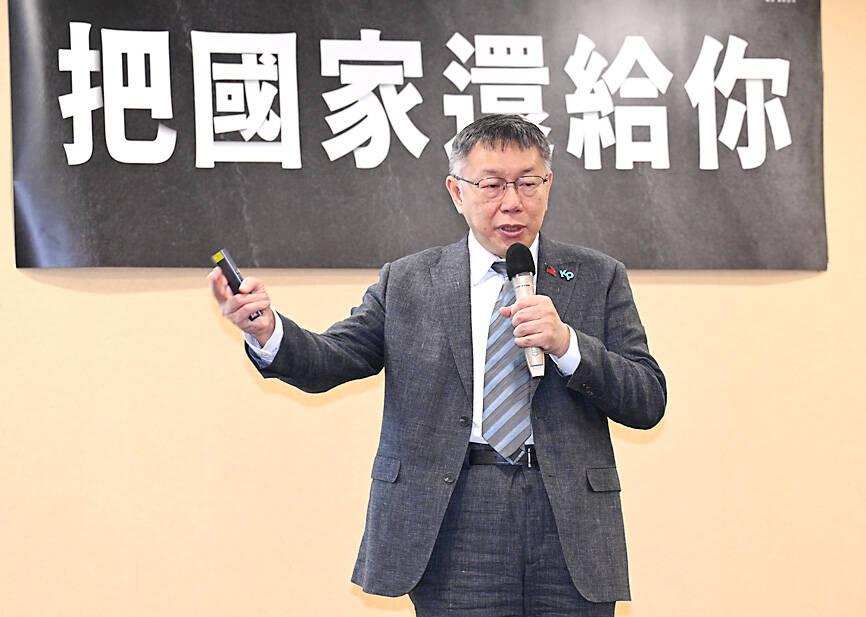Taiwan People’s Party (TPP) Chairman and presidential candidate Ko Wen-je (柯文哲) yesterday said he would elevate the Cabinet’s role in government, enshrine a parliamentary system into the Constitution and create the position of prime minister if elected.
As Taiwan has experienced three transitions of power since its first presidential elections in 1996, Ko said he has been considering whether the nation’s political problems are in part caused by the dominance of seven elected officials: the president and the mayors of the six special municipalities.
“The winner takes it all, and there are no checks and balances whatsoever,” he said.

Photo: Tien Yu-hua, Taipei Times
Although mayors face questioning by city councilors, the president is not subject to legislative oversight, so strings can be pulled behind the scenes, he said.
Ko said his main priority would be the country’s lasting peace and stability, not his term in office.
Next year’s election is a good opportunity to end the autocratic presidential system and return the power to the people, Ko said.
If elected, he said he would abolish what he calls the “elective monarchy system” and replace it with a Cabinet-run government.
Ko said he would propose that the president’s appointment of the premier be subject to legislative consent, and that Cabinet members be appointed following legislative hearings.
He added that he would advocate reducing the number of government branches from five — the Executive, the Legislative, the Judicial, the Examination and the Control yuans — to three by removing the latter two.
He would push for the open selection of senior civil servants and board members of state-run firms, and scrap the policy that makes special central government budgets a regular practice, Ko said.
He would propose lowering the voting age to 18 from 20 and the minimum age a candidate needs to run for public office to 20 from 23, he said.
Ko said he would seek to lower the 5 percent electoral threshold that a political party must surpass to 3 percent of the overall vote to qualify for the distribution of the 34 legislator-at-large seats.
Democratic Progressive Party spokesman Chang Chih-hao (張志豪) said Ko was contradicting himself, because while he is ostensibly pushing to elevate the Cabinet’s role, he is a monarchist at heart.

Chinese spouse and influencer Guan Guan’s (關關) residency permit has been revoked for repeatedly posting pro-China videos that threaten national security, the National Immigration Agency confirmed today. Guan Guan has said many controversial statements in her videos posted to Douyin (抖音), including “the red flag will soon be painted all over Taiwan” and “Taiwan is an inseparable part of China,” and expressing hope for expedited reunification. The agency last year received multiple reports alleging that Guan Guan had advocated for armed reunification. After verifying the reports, the agency last month issued a notice requiring her to appear and explain her actions. Guan

GIVE AND TAKE: Blood demand continues to rise each year, while fewer young donors are available due to the nation’s falling birthrate, a doctor said Blood donors can redeem points earned from donations to obtain limited edition Formosan black bear travel mugs, the Kaohsiung Blood Center said yesterday, as it announced a goal of stocking 20,000 units of blood prior to the Lunar New Year. The last month of the lunar year is National Blood Donation Month, when local centers seek to stockpile blood for use during the Lunar New Year holiday. The blood demand in southern Taiwan — including Tainan and Kaohsiung, as well as Chiayi, Pingtung, Penghu and Taitung counties — is about 2,000 units per day, the center said. The donation campaign aims to boost

The Kaohsiung Tourism Bureau audited six hotels in an effort to prevent price gouging ahead of Korean band BTS’ concert tour in the city scheduled for Nov. 19, 21 and 22 this year. The bureau on Friday said that the audits — conducted in response to allegations of unfair pricing posted on social media — found no wrongdoing. These establishments included the local branches of Chateau de Chine, Hotel Nikko, My Humble House, and Grand Hai Lai, it said, adding that the Consumer Protection Commission would have penalized price gougers had the accusations been substantiated. The bureau said the Tourism Development Act

BACK TO WINTER: A strong continental cold air mass would move south on Tuesday next week, bringing colder temperatures to northern and central Taiwan A tropical depression east of the Philippines could soon be upgraded to be the first tropical storm of this year, the Central Weather Administration (CWA) said yesterday, adding that the next cold air mass is forecast to arrive on Monday next week. CWA forecaster Cheng Jie-ren (鄭傑仁) said the first tropical depression of this year is over waters east of the Philippines, about 1,867km southeast of Oluanpi (鵝鑾鼻), and could strengthen into Tropical Storm Nokaen by early today. The system is moving slowly from northwest to north, and is expected to remain east of the Philippines with little chance of affecting Taiwan,